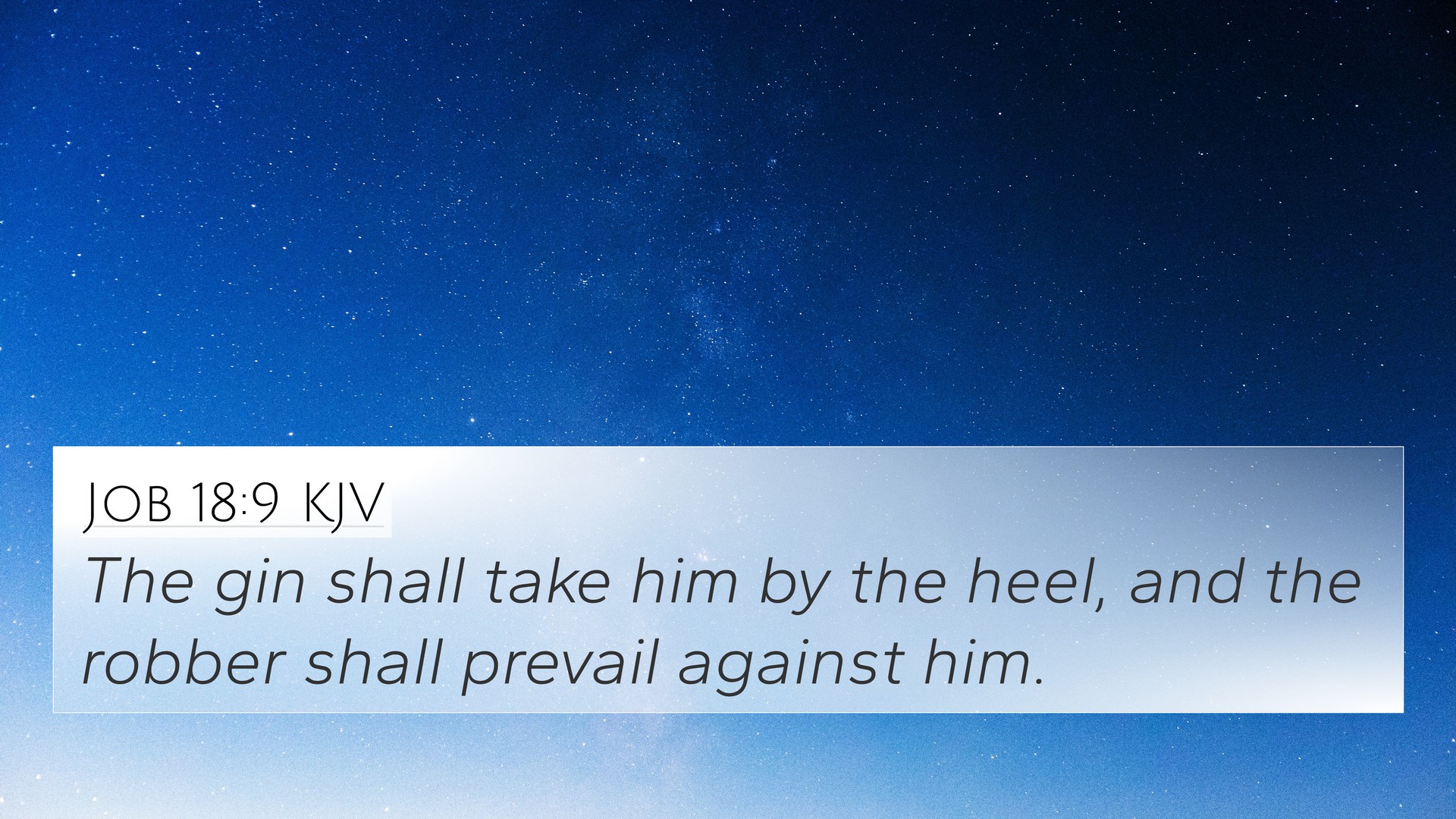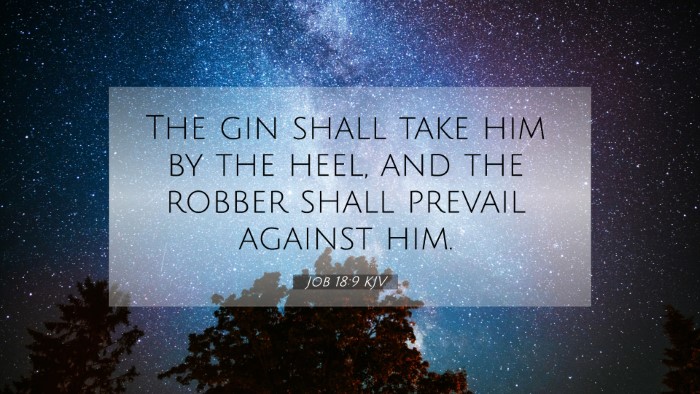Old Testament
Genesis Exodus Leviticus Numbers Deuteronomy Joshua Judges Ruth 1 Samuel 2 Samuel 1 Kings 2 Kings 1 Chronicles 2 Chronicles Ezra Nehemiah Esther Job Psalms Proverbs Ecclesiastes Song of Solomon Isaiah Jeremiah Lamentations Ezekiel Daniel Hosea Joel Amos Obadiah Jonah Micah Nahum Habakkuk Zephaniah Haggai Zechariah MalachiJob 18:9 Similar Verses
Job 18:9 Cross References
The gin shall take him by the heel, and the robber shall prevail against him.
Uncover the Rich Themes and Topics of This Bible Verse
Listed below are the Bible themes associated with Job 18:9. We invite you to explore each theme to gain deeper insights into the Scriptures.
Job 18:9 Cross Reference Verses
This section features a detailed cross-reference designed to enrich your understanding of the Scriptures. Below, you will find carefully selected verses that echo the themes and teachings related to Job 18:9 KJV. Click on any image to explore detailed analyses of related Bible verses and uncover deeper theological insights.
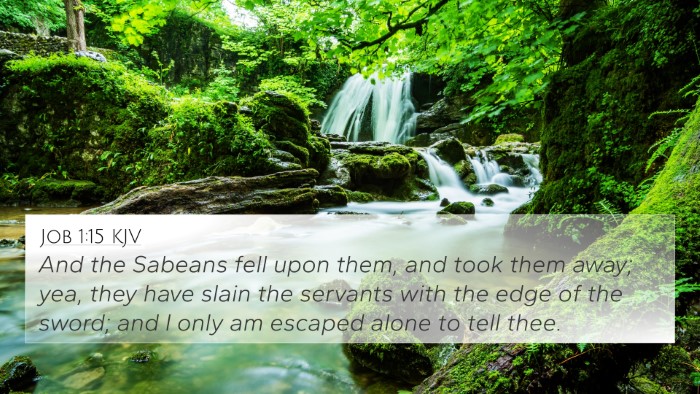
Job 1:15 (KJV) »
And the Sabeans fell upon them, and took them away; yea, they have slain the servants with the edge of the sword; and I only am escaped alone to tell thee.
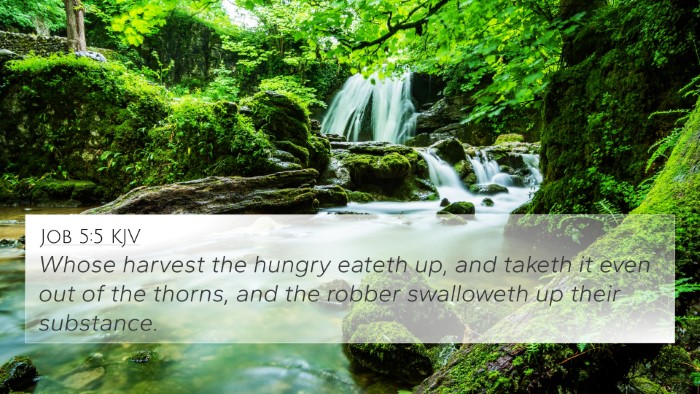
Job 5:5 (KJV) »
Whose harvest the hungry eateth up, and taketh it even out of the thorns, and the robber swalloweth up their substance.
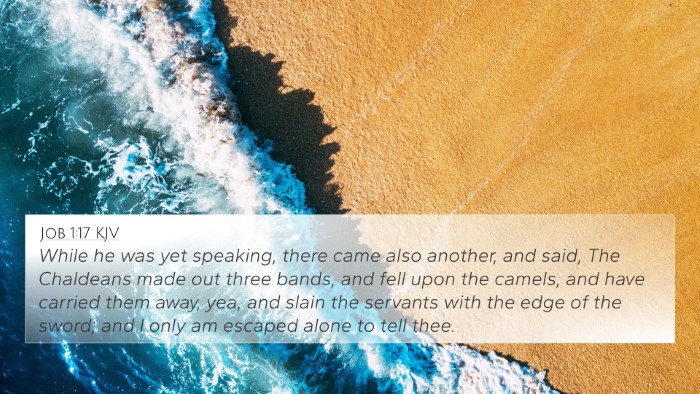
Job 1:17 (KJV) »
While he was yet speaking, there came also another, and said, The Chaldeans made out three bands, and fell upon the camels, and have carried them away, yea, and slain the servants with the edge of the sword; and I only am escaped alone to tell thee.

Isaiah 8:14 (KJV) »
And he shall be for a sanctuary; but for a stone of stumbling and for a rock of offence to both the houses of Israel, for a gin and for a snare to the inhabitants of Jerusalem.
Job 18:9 Verse Analysis and Similar Verses
Understanding Job 18:9
Job 18:9 states:
"The gin shall take him by the heel, and the robber shall prevail against him."
This verse is a part of Bildad's response to Job, emphasizing the perils that come to those who oppose God and the inevitable downfall of the wicked.
Summary of Insights
The verse conveys deep theological implications regarding the fate of the wicked and serves as a stark warning about the consequences of ungodliness. Below is a summarized interpretation from various public domain commentaries:
Insights from Matthew Henry
Henry explains that the “gin” mentioned refers to a trap, indicating how the wicked will inevitably fall into their own snares. The imagery suggests that their ill-gotten gains will become their downfall, demonstrating the retributive justice of God. Henry emphasizes the fate of the ungodly and how their misdeeds will ultimately lead to their destruction.
Insights from Albert Barnes
Barnes discusses the metaphor of the "robber" as symbolic of impending judgment. He insists that the wicked, represented in this verse, may seem strong and prosperous but are ultimately ensnared by their own actions. The mention of the heel suggests a lack of stability, implying that those who live contrary to God's laws will find themselves vulnerable and ultimately overcome.
Insights from Adam Clarke
Clarke elaborates on the imagery used, interpreting the “gin” and the “robber” as depicting the unexpected and sudden destruction that can befall the wicked. He stresses that the verse reassures the faithful that God’s judgment is inevitable, and they can take comfort in the certainty of divine justice.
Cross-Referencing Biblical Texts
To enhance understanding of Job 18:9, consider the following related verses:
- Psalms 7:15-16: "He made a pit, and digged it, and is fallen into the ditch which he made."
- Psalms 9:16: "The LORD is known by the judgment which He executes; the wicked is snared in the work of his own hands."
- Proverbs 26:27: "Whoso diggeth a pit shall fall therein: and he that rolleth a stone, it will return upon him."
- Galatians 6:7: "Be not deceived; God is not mocked: for whatsoever a man soweth, that shall he also reap."
- Isaiah 57:20-21: "But the wicked are like the troubled sea, when it cannot rest, whose waters cast up mire and dirt."
- Job 4:8: "Even as I have seen, they that plow iniquity, and sow wickedness, reap the same."
- Romans 2:6: "Who will render to every man according to his deeds."
Thematic Connections
This verse is part of a larger thematic discourse on judgment, divine justice, and the fate of the ungodly—central themes throughout the Bible. These connections provide a framework for understanding the moral fabric of scripture, particularly:
- The Consequences of Sin: The consistent message of scripture reveals that actions have consequences, a principle noted repeatedly across both Testaments.
- God's Sovereignty: The sovereignty of God in executing judgment reinforces the idea that no one can escape accountability.
- Hope and Restoration: The predicament of the wicked ultimately contrasts with the hope offered to the righteous, cementing the narrative of redemption.
Tools for Bible Cross-Referencing
To deeply engage with scripture and uncover connections, various tools can be utilized:
- Bible Concordance: A useful resource for locating scriptures by keywords.
- Bible Cross-Reference Guide: Helps identify scripture links and facilitates thematic studies.
- Cross-Reference Bible Study: Techniques employing structured connections for deeper elucidation.
- Bible Reference Resources: Comprehensive materials that aid in understanding and connecting scripture.
Conclusion
Job 18:9 serves as a potent reminder of the fate awaiting those who lead lives contrary to God's will. By utilizing cross-references and thematic connections, readers can either draw parallels to other scriptures or explore deeper insights into God’s justice and mercy.
